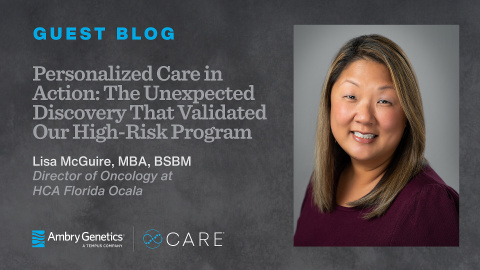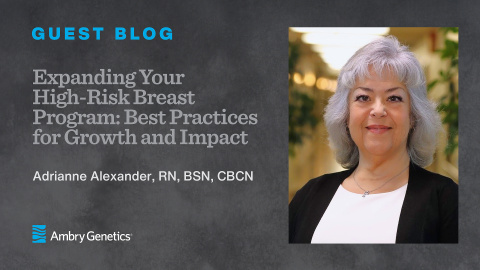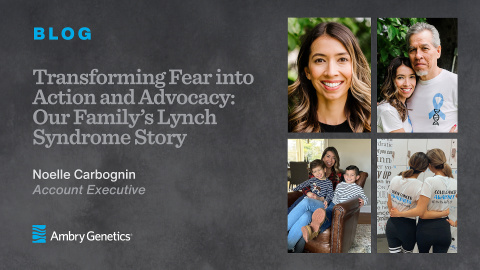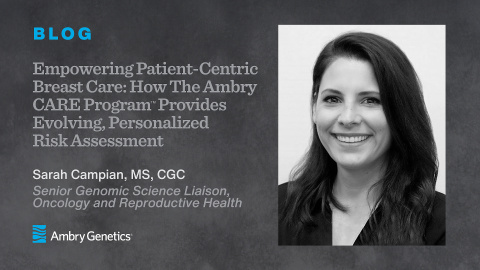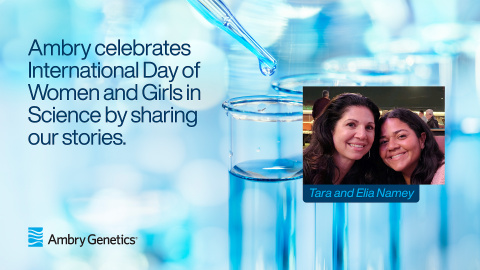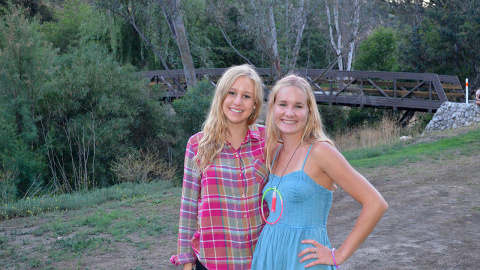- By Lisa McGuire, MBA, BSBM
- Posted June 4, 2025
Personalized Care in Action: The Unexpected Discovery That Validated Our High-Risk Program
As the Director of Oncology at HCA Florida Ocala, I've witnessed firsthand how the combination of innovative technology and dedicated healthcare teams can transform patient outcomes. When we launched our high-risk women's program in 2023, I served as project manager, coordinating the implementation of the Ambry CARE Program® (CARE) across our…
- By Adrianne Alexander, RN, BSN, CBC
- Posted July 17, 2024
Expanding Your High-Risk Breast Program: Best Practices for Growth and Impact
One of the accomplishments I am most proud of is driving the creation of a successful high-risk breast program in a large community-based health system. I am often asked how we did it. For advice on getting started, check out the first blog in this series. If you have already implemented a high-risk breast program, congratulations! It’s time…
- By Noelle Carbognin
- Posted March 22, 2024
Transforming Fear into Action and Advocacy: Our Family’s Lynch Syndrome Story
It has been almost 3 years since my father was offered genetic testing after developing three different types of cancers. He also had an alarming family history – multiple relatives with cancer, going back generations. After he received a positive result for Lynch Syndrome, putting him at an increased risk for colon cancer and other types of…
- By Sarah Campian, MS, CGC
- Posted March 20, 2024
Empowering Patient-Centric Breast Care: How The Ambry CARE Program™ Provides Evolving, Personalized Risk Assessment
How would you respond if a patient asked, "What is my risk of getting breast cancer"? We may initially reference the national average: 1 in 8 (or about 13% of) people assigned female at birth (AFAB) develop breast cancer.1 However, we live in an age of personalized medicine; this statistic cannot be applied universally to every patient. Further,…
- By Tara Namey, MS, LCGC
- Posted February 10, 2023
Like Mother, Like Daughter: Tara and Elia Namey Advance Women in STEM Leadership
Elia Namey discusses Disparities in the Uptake of Cascade Testing. February 11 is recognized as International Day of Women and Girls in Science! Ambry feels privileged to have many women in high positions leading the company’s scientific progress. To celebrate, we’re introducing one of the women who leads the way in genetics at Ambry…
- By Jessica Profato, MS, CGC
- Posted June 8, 2018
I Survived Cancer, so Why do I Need Genetic Testing for it?
As a clinical genetic counselor, I saw many cancer survivors for genetic counseling. In some cases, it had been 30-40 years since they were diagnosed. Some of them were in their 60s-70s when I saw them, but they were young at the time of their cancer diagnosis. Years later, they were referred to me to talk about the possibility that their history…
- By Tiana Adams, PA-C, MBA
- Posted July 7, 2016
You Need to Know These: Signs and Symptoms of Breast Cancer
My name is Tiana Adams, and I am a practicing Physician Assistant with 18 years of clinical experience. During this time I have worked in many specialties, including Family Practice, Urgent Care, Occupational Medicine, Orthopedics and Breast Cancer Surgery. Currently, I am the Oncology Operations Specialist at Ambry. Moving into this role is something…
- By Carin Espenschied
- Posted June 22, 2016
Decisions, Decisions: What To Consider When Deciding On Risk Reducing Surgery
If you have been diagnosed with an inherited colorectal cancer syndrome, your healthcare provider may have recommended that you consider having risk reducing surgery. Risk reducing colectomy is the removal of part (partial colectomy) or all (total colectomy) of the colon to reduce the risk of developing future cancer. Risk reducing hysterectomy…
- By Theresa Smith
- Posted April 7, 2016
What Can I Do Until My Children Can Be Tested?
Dealing with your own BRCA1 or BRCA2 genetic testing results is one thing, but worrying about testing for your children is another. Especially when they are under 18 years old. There is a very real possibility that people will have to wait for years for their kids to find out if they are positive or negative for the mutation.…
- By Theresa Smith
- Posted February 23, 2016
What about my “foobies” surgery?
I did finally come to terms with my decision to have a preventive bilateral mastectomy to lower my risk of breast cancer from my BRCA2 gene mutation. I was scheduled with my surgeon, but I was put on a rolling schedule, which meant my date was not set in stone. I asked at what point I got to keep my surgery date, instead of my date being…
